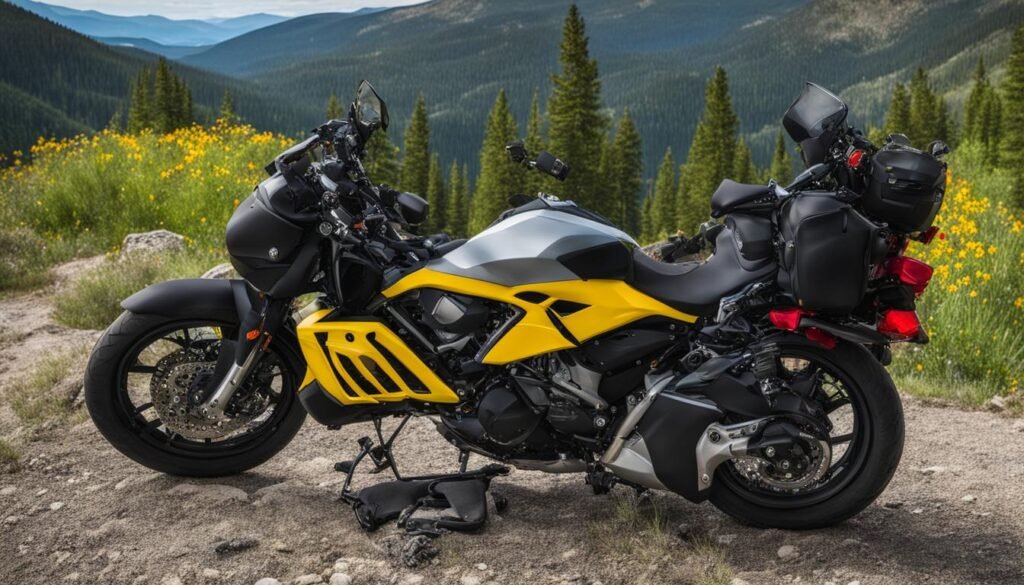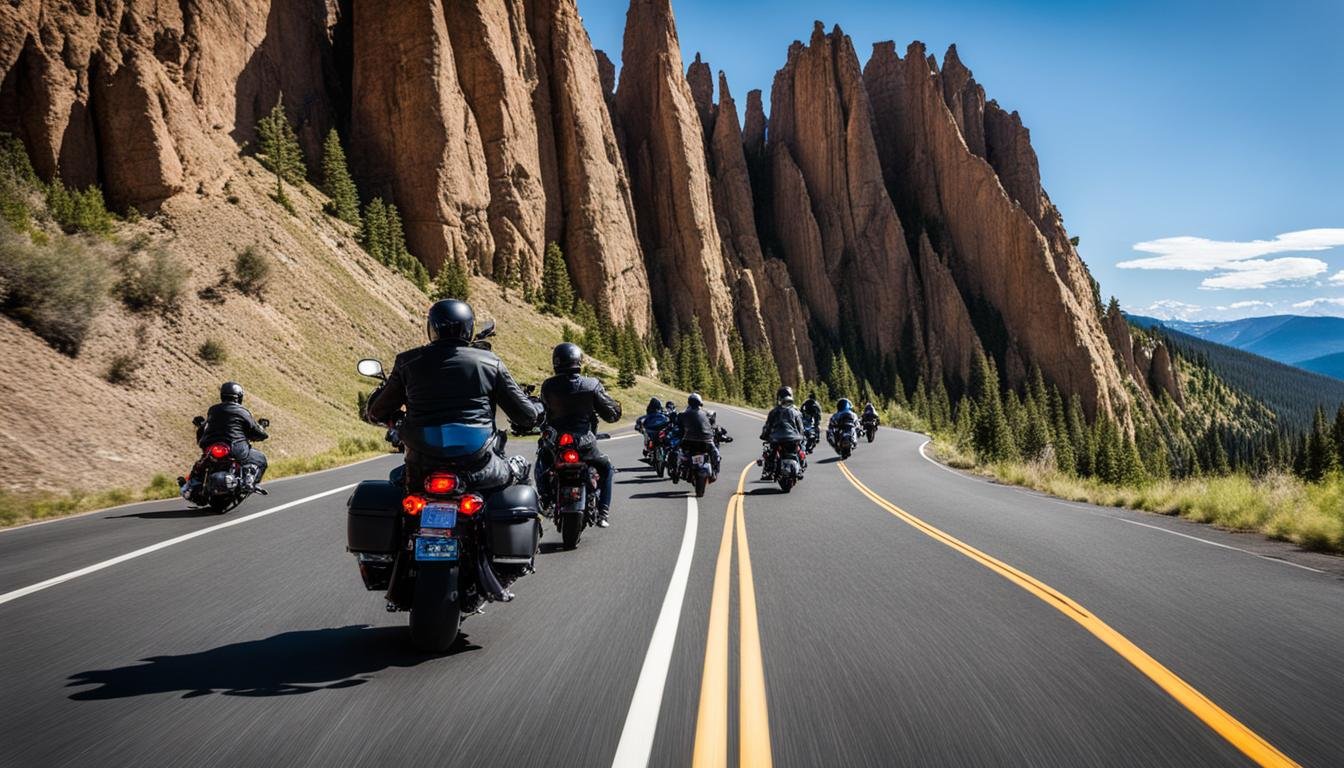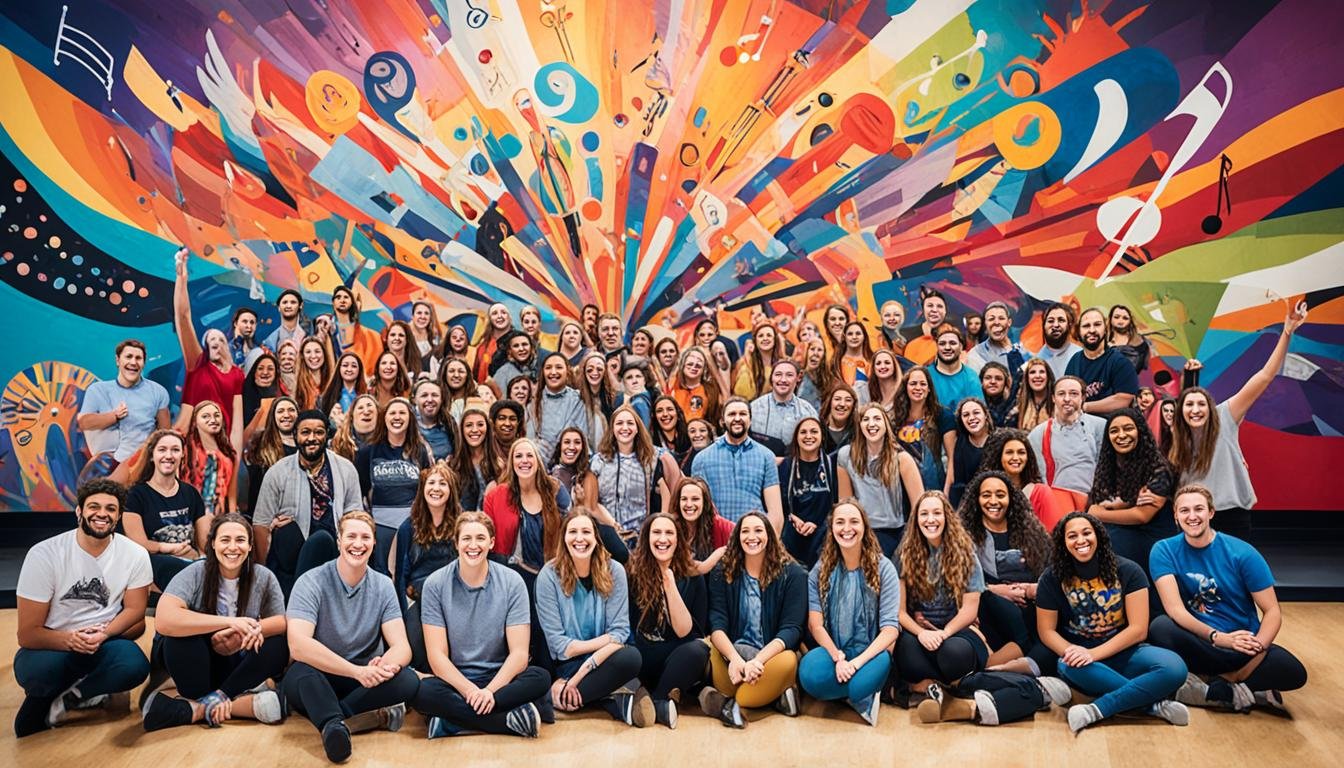Motorcycle riders in Colorado must adhere to specific laws and regulations to ensure their safety and legal compliance. Understanding the motorcycle laws in Colorado is essential for both experienced riders and those new to motorcycles. By familiarizing themselves with these laws, riders can confidently navigate the roads while enjoying their motorcycles.
Colorado’s motorcycle laws encompass various aspects, including helmet requirements, license endorsements, safety gear, compliance with traffic laws, and more. By following these laws, riders can help reduce the risk of accidents and ensure a safer riding experience for everyone on the road.
Key Takeaways:
- Motorcycle riders in Colorado must comply with all traffic laws applicable to other motor vehicles.
- Riders aged 18 and over are not required to wear helmets, but passengers and riders under 18 must wear DOT-approved helmets.
- All riders must have eye protection, such as a visor on a helmet or safety glasses.
- Motorcycle riders must have a valid motorcycle endorsement or a separate motorcycle license.
- Motorcyclists in Colorado must adhere to the same traffic laws as other motorists.
Safety Gear and Equipment Requirements
Ensuring proper safety gear is a top priority for motorcycle riders in Colorado. While helmets are not mandatory for riders over 18 years old, it is highly recommended for their safety. However, riders under 18 and their passengers must wear DOT-approved helmets at all times. This rule helps protect the most vulnerable riders and passengers from severe head injuries in the event of an accident.
Eye protection is another essential requirement for all riders and passengers. Whether it’s a visor on a helmet or safety goggles, having proper eye protection is crucial to shield against debris, wind, and other potential hazards on the road.
Passengers also have specific safety requirements in Colorado. They must use footrests while riding, ensuring stability and balance throughout the journey. Additionally, passengers are required to sit behind the driver or in a sidecar, rather than in front, to maintain proper weight distribution and avoid any interference with the driver’s control.
“Wearing a helmet and using safety gear is not just about following the law but also protecting yourself and your loved ones. The right gear can make a significant difference in reducing the severity of injuries in case of an accident.”
| Rider Type | Helmet Requirement | Eye Protection Requirement |
|---|---|---|
| Riders 18 and over | Not mandatory, but highly recommended | Required |
| Riders under 18 | Required | Required |
| Passengers | Required | Required |
Colorado Motorcycle License Requirements
To legally drive a motorcycle in Colorado, riders must fulfill specific requirements and obtain the necessary license or endorsement. Let’s take a closer look at the Colorado motorcycle license requirements:
Motorcycle License vs. Motorcycle Endorsement
In Colorado, riders have two options to legally operate a motorcycle: obtaining a separate motorcycle license or obtaining a motorcycle endorsement on their existing driver’s license. Both options require meeting certain criteria.
Age and Parental Consent
Riders under 18 years of age must have parental consent to obtain a motorcycle endorsement or license. This requirement aims to ensure the safety and proper supervision of young riders.
Basic Rider Course (BRC)
Completing an approved Basic Rider Course (BRC) is mandatory for riders under 18 years of age. The BRC provides essential safety training and skills development for motorcycle riders. It covers topics such as proper control, maneuvering, and defensive riding techniques.
Written Knowledge Test
All riders, regardless of age, must pass a written knowledge test administered by the Colorado Department of Motor Vehicles (DMV). The test assesses the rider’s understanding of motorcycle laws, safety practices, and traffic regulations.
On-Cycle Riding Skills Test
In addition to the written knowledge test, riders are required to pass an on-cycle riding skills test conducted by the DMV. This practical examination evaluates the rider’s ability to safely operate a motorcycle, demonstrating proficiency in essential riding maneuvers and control.
Motorcycle Insurance and Registration
Motorcycle insurance coverage is mandatory in Colorado. Before riding, riders must ensure their motorcycles are properly insured, registered with the DMV, and display valid license plates or temporary permits.
Stay Safe and Compliant
By meeting the Colorado motorcycle license requirements, riders can enjoy the freedom of riding while staying safe and compliant with state regulations. It’s important to note that obtaining a motorcycle license or endorsement is just the beginning of a rider’s journey. Continuous learning, regular practice, and responsible riding are essential for a fulfilling and safe motorcycle experience.
| License Requirement | Details |
|---|---|
| Age and Parental Consent | Riders under 18 years of age must have parental consent to obtain a motorcycle endorsement or license. |
| Basic Rider Course (BRC) | Riders under 18 years of age must complete an approved Basic Rider Course (BRC). |
| Written Knowledge Test | All riders must pass a written knowledge test administered by the DMV. |
| On-Cycle Riding Skills Test | Riders must pass an on-cycle riding skills test conducted by the DMV. |
| Motorcycle Insurance and Registration | Motorcycles must be properly insured, registered with the DMV, and display valid license plates or temporary permits. |
Ensure you fulfill the necessary requirements and obtain the proper license or endorsement to enjoy the thrill of riding while staying safe and compliant. So, gear up, follow the rules of the road, and have an unforgettable motorcycle adventure in the beautiful state of Colorado!
Compliance with Traffic Laws
Motorcyclists in Colorado must adhere to the same traffic laws as other motorists, ensuring a safe and efficient flow of traffic for everyone on the road. While motorcycles offer unique benefits, such as maneuverability and agility, it is essential for riders to understand and follow the specific regulations that govern their use of the road.
One important aspect of compliance with Colorado traffic laws is the prohibition on passing or overtaking a vehicle in the same lane. This rule applies to all vehicles, including motorcycles, and is in place to prevent hazardous situations and maintain orderly traffic flow.
“Motorcycles cannot share a lane or ‘co-ride’ with cars,” says Brian Johnson, a traffic law expert. “However, motorcycles are permitted to share a lane with one other motorcycle, creating opportunities for safer and more efficient travel.” This allows motorcyclists to take advantage of the benefits of riding in a group while still maintaining appropriate spacing and ensuring their own safety.
Another important aspect of compliance with traffic laws is the prohibition on attaching a motorcycle to another vehicle, such as grabbing onto another motorcycle or vehicle for towing. This practice is dangerous and can lead to accidents and injuries.
By following these traffic regulations, motorcyclists can contribute to safer road conditions and minimize the risk of accidents. Understanding and respecting these laws not only ensures personal safety but also promotes a positive image of motorcyclists in the community.
Compliance with Traffic Laws: Key Points
- Passing or overtaking a vehicle in the same lane is illegal for motorcycles and other vehicles.
- Motorcycles can share a lane with one other motorcycle.
- Attaching a motorcycle to another vehicle is strictly prohibited.
Expert Insight
“Motorcycles are granted the privilege of sharing a lane with another motorcycle, providing greater flexibility and opportunities for safer travel. However, it is crucial for riders to respect the law and avoid dangerous practices, such as attempting to tow a motorcycle with another vehicle.”
Brian Johnson, Traffic Law Expert
Colorado Motorcycle Traffic Law Compliance
| Compliance | Regulation |
|---|---|
| Passing/Overtaking Another Vehicle | Illegal in the same lane |
| Lane Sharing with Cars | Prohibited |
| Lane Sharing with Motorcycles | Permitted with one other motorcycle |
| Attaching Motorcycle to Another Vehicle | Strictly Prohibited |
Compliance with traffic laws ensures that motorcyclists can enjoy their rides safely and responsibly while respecting the rights of other road users. By being mindful of these regulations, riders can experience the thrill of the open road while maintaining a high level of safety.
Lane Splitting Laws in Colorado
Lane splitting, the practice of a motorcyclist overtaking and passing other vehicles in the same lane, is currently illegal in Colorado. However, there is a proposed bill, HB23-1059, introduced in the 2023 Regular Session, to conduct a study on motorcycle lane splitting to determine if it should be allowed.
While lane splitting is not permitted under current Colorado motorcycle laws, the proposed bill offers the opportunity to reevaluate and potentially change regulations surrounding this practice. If approved, the study could provide valuable insights into the safety and efficiency of lane splitting in Colorado.
Proponents of lane splitting argue that it can alleviate traffic congestion, reduce rear-end collisions caused by inattentive drivers, and make motorcycles more visible on the road. However, opponents raise concerns about potential safety risks, such as increased accidents due to close proximity between motorcycles and other vehicles.
Until the results of the study are known and potential new legislation is passed, it is crucial for motorcyclists in Colorado to obey the current lane splitting laws to ensure their safety and legal compliance.
License Requirements for Motorcycle Operation

Operating a motorcycle in Colorado requires fulfilling specific license requirements and ensuring compliance with license plate laws. To legally ride a motorcycle in the state, individuals must meet the following criteria:
- Motorcycle License or Endorsement: Riders must possess a valid motorcycle license or endorsement on their driver’s license. This indicates that they have completed the necessary training and testing to safely operate a motorcycle. Those with an out-of-state motorcycle license are also accepted in Colorado.
- Motorcycle Registration: All motorcycles ridden on public roads must be registered with the Colorado Department of Motor Vehicles (DMV). This registration ensures that the motorcycle meets state safety and emissions standards.
- License Plates: Motorcycles must display valid license plates issued by the DMV. These license plates should be securely fastened and clearly visible at all times.
License Requirements for Out-of-State Riders
If you possess a valid motorcycle license from another state, Colorado recognizes it as a legal license to operate a motorcycle within its borders. However, it is essential to familiarize yourself with Colorado’s motorcycle laws and regulations to ensure compliance.
Here is an example of a table that highlights the license plate fees in Colorado:
| License Plate Type | Initial Fee | Annual Renewal Fee |
|---|---|---|
| Standard Motorcycle Plate | $24.00 | $25.00 |
| Personalized Motorcycle Plate | $60.00 | $25.00 |
| Specialty Motorcycle Plate | Varies | Varies |
Please note that these fees are subject to change. It’s always recommended to consult the Colorado DMV website or contact your local DMV office for the most up-to-date information on license plate fees.
Helmet Laws in Colorado
While Colorado does not have a universal helmet law, requiring all riders to wear helmets, riders and passengers under the age of 18 must wear DOT-approved helmets. Wearing a helmet is optional for riders aged 18 and over, but it is strongly recommended for their safety.
Protecting your head is crucial when riding a motorcycle, as it can significantly reduce the risk of severe head injuries in case of an accident. Even though Colorado does not mandate helmet use for adult riders, wearing a helmet is a responsible choice that can save lives and prevent devastating injuries.
Statistics show that wearing a helmet dramatically reduces the likelihood of head trauma, brain injuries, and fatalities in motorcycle accidents. By choosing to wear a DOT-approved helmet, riders can ensure their safety and enhance their overall riding experience.
When selecting a helmet, it’s important to choose one that meets the safety standards set by the Department of Transportation (DOT). These helmets have been rigorously tested and approved to provide adequate protection in the event of an accident.
A DOT-approved helmet should feature a sturdy outer shell, a comfortable fit, proper ventilation, and a secure chin strap. It’s crucial to ensure that the helmet covers the entirety of the head, including the forehead and the back of the skull.
While it is your right to choose whether or not to wear a helmet as an adult rider in Colorado, it’s essential to prioritize your safety and well-being. By wearing a helmet, you demonstrate a commitment to responsible riding and set a positive example for others.
Remember, motorcycle accidents can happen to anyone, and even the most experienced riders are not immune to the risks on the road. Wearing a helmet is one of the simplest and most effective ways to protect yourself and minimize the potential for life-changing injuries.
Benefits of Wearing a Helmet:
- Prevents head injuries and traumatic brain injuries (TBI)
- Reduces the risk of fatalities in motorcycle accidents
- Protects against facial injuries, abrasions, and cuts
- Enhances rider visibility and reduces wind noise
- Increased rider confidence and comfort
By wearing a helmet, you are taking a proactive step towards your own safety and well-being as a motorcyclist. Be a responsible rider and prioritize your protection on every ride.
Additional Equipment Requirements

In addition to the safety gear and license requirements, Colorado’s motorcycle laws also specify certain equipment requirements for motorcycles. These regulations ensure that motorcycles on the road are equipped with the necessary features for safe operation and visibility.
Footrests for Passengers
One of the additional equipment requirements in Colorado is the presence of footrests for passengers on motorcycles. These footrests are essential for providing a secure and comfortable riding experience for passengers. Passengers must use the footrests while riding to maintain stability and minimize the risk of falls or accidents.
Mirrors and Turn Signals
While turn signals are not mandatory on motorcycles in Colorado, the state requires motorcycles to have at least one mirror. Mirrors play a crucial role in allowing riders to have a clear view of their surroundings, enhancing safety while changing lanes or making turns.
Operational Lights and License Plates
Motorcycles must also be equipped with operational lights for riding at night. These lights include headlights, taillights, and brake lights, ensuring visibility for both the rider and other motorists on the road. Additionally, motorcycles must display properly mounted license plates to comply with registration requirements and enable easy identification.
In summary, Colorado’s motorcycle laws specify additional equipment requirements to enhance safety and visibility on the road. This includes the presence of footrests for passengers, at least one mirror, and operational lights for night riding. By ensuring compliance with these regulations, motorcycle riders can contribute to a safer riding environment for themselves and others.
Scooters, Mopeds, and Motorcycle Classification
In Colorado, any scooter, moped, or motorcycle with a 50cc engine or larger is classified as a motorcycle. This classification is important because it determines the legal requirements for these vehicles. To operate a scooter, moped, or motorcycle in Colorado, it must be insured and legally registered with the DMV for operation on public roads.
If you own a scooter, moped, or motorcycle in Colorado, it is crucial to understand the specific regulations and laws that apply to these vehicles. By complying with these regulations, you can ensure that you are riding safely and within the bounds of the law.
Classification of Scooters, Mopeds, and Motorcycles
In Colorado, scooters, mopeds, and motorcycles are classified based on their engine size. Any vehicle with a 50cc engine or larger falls under the classification of a motorcycle. This includes a wide range of two-wheeled vehicles, including:
- Scooters
- Mopeds
- Motorcycles
Regardless of the specific type of vehicle you own, if it has a 50cc engine or larger, it must comply with all the relevant motorcycle laws and regulations in Colorado.
Requirements for Scooters, Mopeds, and Motorcycles
Since scooters, mopeds, and motorcycles are classified as motorcycles in Colorado, they are subject to the same legal requirements. Here are some of the key requirements:
| Requirement | Description |
|---|---|
| Insurance | All motorcycles, including scooters and mopeds, must be insured. Valid proof of insurance should be carried at all times. |
| Registration | Motorcycles must be legally registered with the Colorado Division of Motor Vehicles (DMV) and display valid license plates or temporary permits. |
By fulfilling these requirements, scooter, moped, and motorcycle owners can ensure that they are in compliance with Colorado’s motorcycle laws and regulations.
Eye Protection Requirements
Ensuring the safety of motorcycle riders and passengers is of utmost importance in Colorado, which is why the state has stringent eye protection requirements in place.
All drivers and passengers are required to wear eye protection at all times, regardless of age or experience. This helps protect their eyes from debris, wind, and other potential hazards on the road.
While a visor on a helmet satisfies this requirement, riders can also opt for goggles or eyeglasses with plastic or safety lenses. The key is to have adequate eye coverage to shield against any potential impact or obstacles.
Colorado’s motorcycle safety laws prioritize the well-being of all road users, and compliance with these eye protection requirements plays a crucial role in ensuring the safety of riders and passengers alike.
| Eye Protection Type | Accepted in Colorado |
|---|---|
| Helmet Visor | Yes |
| Goggles | Yes |
| Eyeglasses with Plastic or Safety Lenses | Yes |
| Sunglasses | No |
| Tinted Helmet Visor or Glasses | No |
Conclusion
Understanding and adhering to Colorado’s motorcycle laws and regulations is paramount for the safety and legal compliance of motorcycle riders in the state. By following these laws, riders can minimize risks and enjoy their journeys on the open road. However, accidents can still occur, and in such unfortunate circumstances, it is crucial for riders to seek legal assistance from experienced attorneys who specialize in motorcycle accidents.
Bachus & Schanker, a trusted law firm in Colorado, is dedicated to advocating for motorcycle accident victims and providing expert legal guidance. With their expertise and commitment, they can protect riders’ rights and help them pursue fair compensation for injuries sustained in motorcycle accidents.
Whether it’s understanding the intricate details of Colorado motorcycle laws or navigating the legal complexities following an accident, Bachus & Schanker has the knowledge and experience to assist motorcycle riders in need. Stay informed, ride safe, and remember to consult trusted legal professionals when necessary.
FAQ
What are the motorcycle laws in Colorado?
Motorcycle drivers in Colorado are required to comply with all traffic laws applicable to other motor vehicles.
Do I need to wear a helmet while riding a motorcycle in Colorado?
While helmet use is not mandatory for riders aged 18 and over, passengers and operators under the age of 18 must wear DOT-approved helmets.
Is eye protection required for motorcycle riders in Colorado?
Yes, eye protection such as a visor on a helmet or safety glasses is required for all riders.
Can motorcycles share a lane with other vehicles in Colorado?
No, lane sharing or splitting is illegal in Colorado, but motorcycles can share a lane with one other motorcycle.
Can I attach my motorcycle to another vehicle while on the road?
No, attaching a motorcycle to another vehicle, such as grabbing onto another motorcycle or vehicle for towing, is prohibited.
What are the motorcycle license requirements in Colorado?
To legally drive a motorcycle in Colorado, riders must have a valid motorcycle endorsement on their driver’s license or hold a separate motorcycle license.
Do I need motorcycle insurance in Colorado?
Yes, motorcycle insurance coverage is mandatory in Colorado.
What are the additional equipment requirements for motorcycles in Colorado?
Colorado’s minimum safety standards for motorcycles include footrests for passengers and operational lights at night. Turn signals are not mandatory, but motorcycles must have at least one mirror.
How are scooters, mopeds, and motorcycles classified in Colorado?
Any scooter, moped, or motorcycle with a 50cc engine or larger is classified as a motorcycle in Colorado.
Do I need to wear eye protection while riding a motorcycle in Colorado?
Yes, Colorado’s motorcycle laws require all drivers and passengers to wear eye protection at all times.
What should I do if I’m in a motorcycle accident in Colorado?
Seek legal assistance from experienced attorneys like Bachus & Schanker, who specialize in advocating for motorcycle accident victims and providing expert legal guidance.








